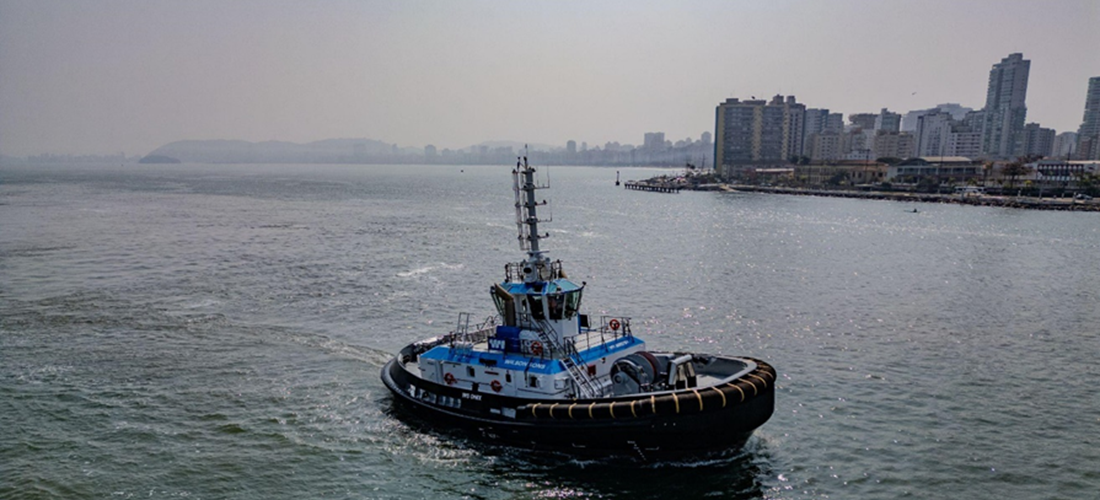
Wilson Sons Launches WS Onix, Final Tugboat in Sustainable Technology Series, Boosting Port Efficiency at Santos Port
Sep, 16, 2024 Posted by Sylvia SchandertWeek 202437
Wilson Sons has commenced operations of the WS Onix at the Porto de Santos. Launched in August, the WS Onix is the sixth and final tugboat in the 2513 class, featuring more sustainable technology and high power, built at the company’s shipyard in Guarujá (SP). Over the past two years, the six new vessels have performed more than 5,000 port maneuvers, contributing to the development of the local economy and Brazilian foreign trade.
New Vessels: Sustainable Technology
With this addition, the company has boosted its fleet of over 80 tugs operating along Brazil’s coast, enhancing support for the docking and undocking large ships, including the New Panamax vessels, measuring 366 meters, and special operations at sea. The new series boasts over 90 tons of bollard pull and is the first in Brazil to meet the IMO TIER III standard set by the International Maritime Organization, which certifies a reduction of up to 70% in nitrogen oxides.
This standard is required only in emission control areas, such as regions in North America and Europe.
The new hull design, from Dutch shipbuilder Damen Shipyards, reduces greenhouse gas emissions with an estimated 14% decrease in fossil fuel consumption, improving air quality at the ports where they operate. The twin fins enhance maneuverability and increase towing capacity, leading to lower fuel consumption and fewer emissions. The vessels are 25 meters long and 13 meters wide, operating efficiently both forward and backward, suitable for port maneuvers and ocean towing.
Operations at Brazilian Ports and Terminals
With funding from the Merchant Marine Fund (FMM) and BNDES as the financial agent, the construction of the six new tugs began with the delivery of the WS Centaurus in July 2022. This vessel operates at the Ponta da Madeira, Itaqui, and Alumar terminals in São Luís (MA), serving large export ships carrying up to 400,000 tons of cargo. Ponta da Madeira supports vessels handling iron ore, while Itaqui assists with ships carrying diesel, corn, soybeans, fertilizers, and cellulose.
Following this, the WS Orion was launched. He joined the WS Centaurus in the same region, followed by the WS Rosalvo (operating at the Port of Açu in São João da Barra – RJ, supporting mining and energy industries), the WS Castor (recently deployed at the Port of Açu), and the WS Dorado (also operating at the São Luís port complex in Maranhão). The WS Onix was completed earlier this semester.
“With advanced hydrodynamics and cutting-edge technology, these tugs are the most powerful in operation in Brazil, marking a milestone for the sector. Capable of meeting superior safety and efficiency standards for increasingly larger vessels, these vessels demonstrate that technology and innovation are key to improving port operations, enhancing maritime infrastructure, and contributing to Brazil’s development,” says Márcio Castro, Executive Director of Wilson Sons’ Tugboat Division.
Shipyard Achievements
With the launch of the WS Onix, Wilson Sons has now built 154 vessels at its shipyard. Its more than 80 tugs operating along the Brazilian coast are involved in over 40% of the country’s ship maneuvers. This impact positively affects global industries and societies, ensuring international trade flows safely, sustainably, and efficiently.
“The series of six new tugs with cutting-edge technology, completed with the WS Onix, adds value for all our stakeholders and represents a significant step in shipbuilding and advancing our industry,” highlights Adalberto Souza, Executive Director of Wilson Sons’ shipyard division.
-
Grains
Jan, 06, 2025
0
Robust 2025 Rice Harvest Poses Challenges, Highlights Export Potential
-
Ports and Terminals
Dec, 08, 2022
0
VLI technology to optimize cargo handling arrives at TPD terminal
-
Other Logistics
May, 24, 2024
0
VLI Sets Record Sugar Transport Volume in 2023/24 Harvest
-
Other Cargo
Mar, 06, 2025
0
China Authorizes Ten Brazilian Companies to Export Sesame



